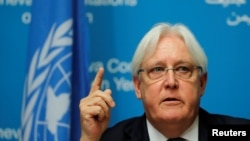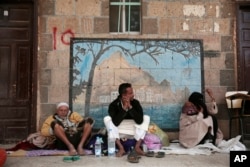The U.N. special envoy for Yemen, Martin Griffiths, is hopeful that talks in coming days with delegations from the government of Yemen and Houthi rebels will lead to full-blown peace negotiations.
Thursday’s formal consultations will be the first time in two years that Yemen’s warring parties will meet. Griffiths calls this an opportunity to restart talks. Griffiths does not underestimate the difficulties ahead, but said it will be important to focus on confidence-building measures to reactivate the peace process.
“Confidence-building measures are designed partly to help build this trust through agreements on them, partly to actually deliver some benefits for the people of Yemen and partly to send a signal to the international community and the people of Yemen that something is happening,” Griffiths said.
“People of Yemen, like in any other conflict are desperately in need of a signal of hope.”
The United Nations calls Yemen the world’s worst humanitarian crisis. It reports more than 16,000 civilians have been killed and injured and more than 22 million are in need of humanitarian aid. The war in Yemen is now in its fourth year.
Griffiths said the government delegation has arrived, but the Houthis have been delayed in Yemen and probably will arrive in Geneva on Thursday. In the meantime, Griffiths said he will hold informal talks with the government delegation. When the Houthis arrive, he said he hopes the two parties will hold discussions in the same room, although that is not a necessity.
“We need to discover what the sticking points are,” Griffiths said. “We need to discover in this kind of formal, informal setting what the parties are prepared to do and what they are prepared to prioritize, both in terms of substance, which will come in a later round and in terms of these confidence-building measures.”
Griffiths acknowledges it is not easy for the opposing delegations to come together, given all that has happened during the war. But, he said, it takes a lot of courage for them to come to the table to explore avenues toward peace.
The war pits the government of President Abd-Rabbu Mansour Hadi, based in the south and backed by Saudi Arabia, against the Iran-aligned Houthi movement that controls the north including the capital, Sana’a.





